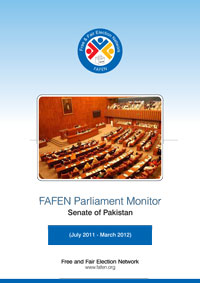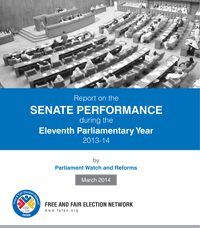National security issues, political instability and executive-judiciary tension largely dominated the proceedings of the nine sessions of Senate held during July 2011 to March 2012. During this period, the Upper House had to respond to urgent matters such as the NATO raid on a Pakistani border post in Salala killing 24 soldiers, multi sector governance crisis, and the situation in Balochistan. Senators highlighted lack of security, widespread sectarian violence, missing persons and the alleged human rights abuses in the province.
However the constitutional consensus in the form of the 18th amendment restoring the 1973 Constitution and fulfilling the long standing demand of giving provinces autonomy achieved another landmark by passing the 20th constitutional amendment, showing that the parliamentary democracy is coming of age in Pakistan.
In a welcome change from the past practice of the government dominating the legislation, during this time period, the Senate also passed the bills brought in by Private Members. Three Private Members’ Bills, all pro-women, were passed.
The Domestic Violence (Prevention and Protection) Bill for the safety of women and children, protecting from any physical, psychological and verbal abuse within homes and at workplaces was passed in the 78th session.
The Criminal Law (Amendment) Bill 2011 (Amendment of section 332, insertion of new sections 336A and 336B in Act XLV of 1860 and amendment of Schedule II of Act V of 1898) addresses the regulations to govern manufacture and supply of acid and the crime itself. According to the bill, any crime that causes hurt to the victim through dangerous means or substances (including fire, heated substance, poison, corrosive substance or acid, explosive or arsenic substance) through contact with the human body (including inhalation or swallowing) is punishable by a prison term which may extend to the culprit’s entire life, or a fine not less than Rs 500,000, or both.
To protect women from the practices depriving them from inheriting property, including forced marriages (badal e suhl, wanni and sawara) and the practice of marriage with the Holy Quran, the Upper House passed the Criminal Law (Amendment) Bill 2011. An important amendment in the law was the insertion of a new section 402D in the Code of Criminal Procedure, which bars a provincial government from suspending, remitting or commuting any sentence passed in a case of rape under Section 376 of the Pakistan Penal Code.
Additionally the Upper House passed 14 treasury-backed bills, including the 20th Amendment of the Constitution, consolidating the process of change of governments and caretaker/interim governments.
Before March 2012, the total membership of the Senate was 100, which after the 18th amendment was increased to 104 – four Senators representing the minorities of Pakistan. After the elections in March 2012 to half of the seats in the Upper House, the parties like JIP, PKMAP and JWP lost representation as they had boycotted the 2008 general elections. The former ruling party PML lost majority in the House as it fared badly in those elections. On the other hand the ruling party PPPP, for the first time in Pakistan’s parliamentary history, gained majority in the Upper House.
According to Article 59 of the constitution, the Upper House has 23 Senators from each province, eight from FATA and four from Islamabad. The 23 seats in Senate allocated to a province are made up of 14 general seats, four each reserved for women and technocrats along with one for a minority Senator. Though a Senator’s term is six years, half of the total Members retire after every three years and elections are held for new Senators.
The issue of missing persons’ and the NATO raid on Salaha check post were addressed by adopting Resolutions. During the nine sessions Senators asked 755 questions – 735 Starred and 20 Un-Starred. The ministries provided answers to most of them (673) while leaving 78 unanswered and four partially answered. In other words the Upper House provided full replies to 89% of the total questions asked during the nine sessions.
During the 73rd session, all 35 starred questions were answered. Out of the total 755 questions, the most of (164) were directed to the Cabinet Secretariat, followed by the Ministry of Finance and Revenue and the Ministry of Communications (69 each).
Thirty-eight Senators asked 755 questions during the nine sessions. Though no female MQM Senator asked any question, only one male parliamentarian of the party asked 102 questions. Additionally none of the two ANP women Senators asked any questions while their four male colleagues asked 80 questions.
Amid Pakistan’s frayed ties with the United States in the backdrop of the NATO supplies which were closed following the attack on Salala check post killing 24 Pakistani soldiers, 60 questions were directed to the Ministry of Foreign Affairs. Senators were also keen to know what was being done to overcome the energy crisis, especially power outages, as they asked 57 questions concerning the Ministry of Water and Power.
Additionally, six out of 10 Calling Attention Notices appearing on the Orders of the Day were taken up by the House.
Another highlight of the reporting period was the approval of new rules for the Upper House. The Rules of
Procedure and Conduct of Business, which replace the rules approved in 1988, have introduced significant changes like making ministers’ presence in the House mandatory during the Question Hour and abolishing discretionary powers of Chairman to appoint the Leader of the Opposition. The Chairman will now seek written applications from Senators nominating their Leader of Opposition. After verifying signatures, the Chairman will declare a Senator having support of the most colleagues as Leader of the Opposition. Similarly the new rules also introduce the Prime Minister’s Question Hour.
As the Senate does not make public the attendance records of members, FAFEN conducts a headcount at the start and the end of each sitting. The attendance of Senators remained low, as on average 21 legislators were present at the beginning and 25 at the end of a sitting. The lowest number of Senators in a single sitting at the outset was, 12 and 19 at the end during the 77th session.
The Leader of the House was present in 31 sittings. His counterpart – the Leader of the Opposition – attended 22 sittings. The Chairman attended 45 sittings, while the Deputy Chairman was there for 22 sittings.
For complete report click here



